History
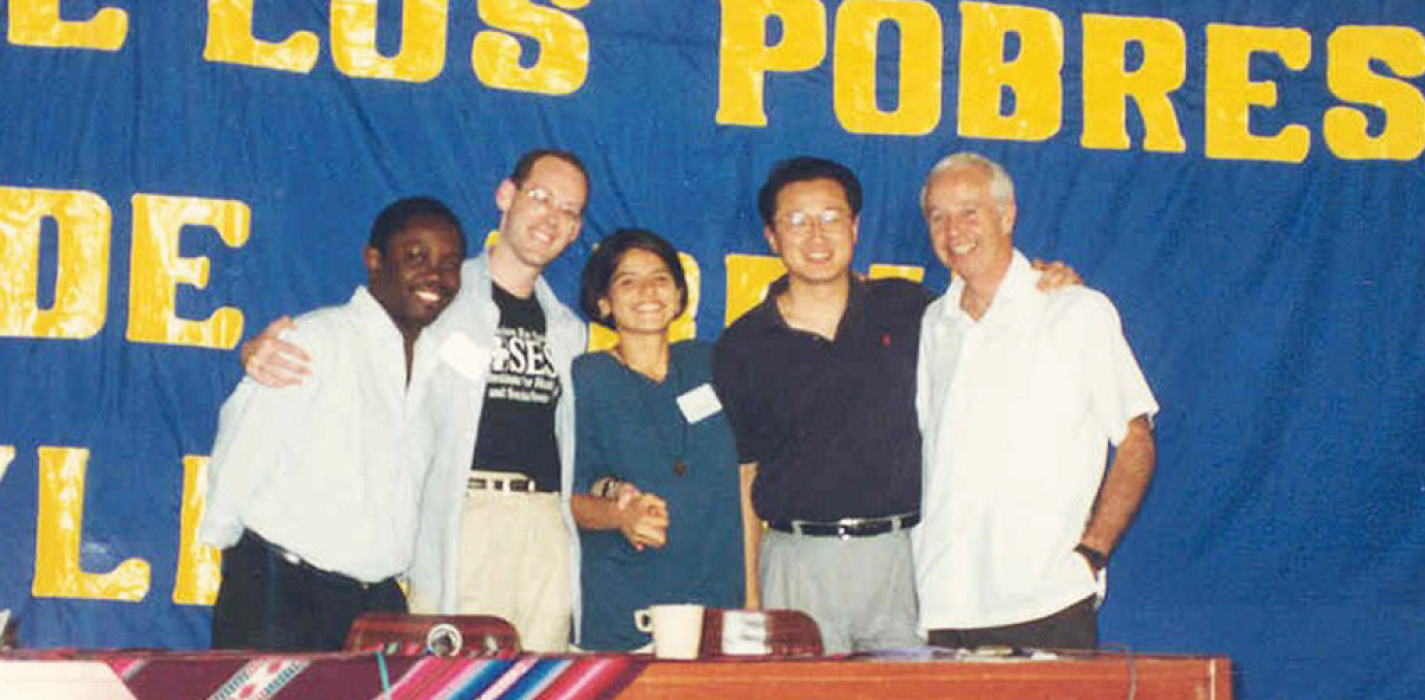
In 1983 the world was about to explode, as the global powers planned to confront each other in an endless cold war. It was the beginning of a political, economic and social crisis that would undoubtedly affect the most vulnerable populations globally.
However, Paul Farmer and Ophelia Dahl (both born in Boston, USA), concerned about global health, would not let this happen in Cage, a small rural village in Haiti, considered one of the poorest countries in the Americas. A nation with a collapsed healthcare system that could soon claim the lives of thousands of people from multidrug-resistant tuberculosis (MDR- TB).
”I was 23 years old, and had not yet started medical school. It was my first trip outside of North America, I was very interested in traveling to Haiti and getting to know its culture; however, I knew nothing of what to expect, but I already wanted to work at the hospital,” shared Paul Farmer, founder of Partner In Health.
Thanks to the many efforts made by Paul and Ophelia, a community clinic was built to provide free medical care in the most remote and rural area of Cange.
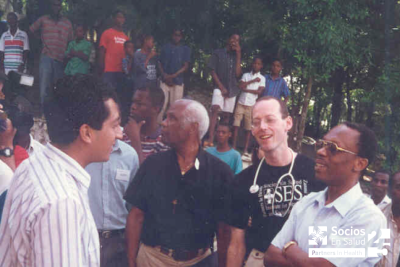
Dres. Paul Farmer y Jaime Bayona en Haití, 1996.
Shortly thereafter, Jim Kim, Todd McCormack and Thomas J. White joined this noble cause and alongside Paul and Ophelia formed Partners In Health. An international non-profit organization willing to guarantee the right to health for everyone through social justice starting with those who need it most.
The hope of thousands of Peruvians was born.
In 1995, Partners In Health arrived in Peru, motivated by Father Jack Roussin, a priest and friend of the founders. Roussinn decided to travel to Lima with the mission to serve the poorest of the poor in South America and soon became the priest of Christ Light of the World parish in Carabayllo, Lima.
The World Health Organization (WHO) considered Peru, one of the countries with the best developing tuberculosis programs in the world. Shortly thereafter, the Partners In Health team would discover the harsh reality.
In Peru, patients diagnosed with tuberculosis had been receiving treatment for years; however, they were still sick. Many of them had active disease and continued to transmit it. At the same time that this problem was detected, father Jack became ill. Shortly after, he passed away, a situation that shocked Paul and Jim, as they discovered that it was due to multidrug-resistant tuberculosis.
To this new challenge, the Peruvian physician Jaime Bayona, who quickly contacted Jim Kim, joined them. It was necessary to replicate the Haitian model of accompaniment, so the recruitment and training of community health workers, who would be in charge of accompanying and providing moral support to patients, was soon begun. The fight against social injustice had begun.
On July 8, 1996, Socios En Salud was born with the aim of responding to multidrug-resistant tuberculosis in the population of Carabayllo, considered one of the poorest districts of Lima.
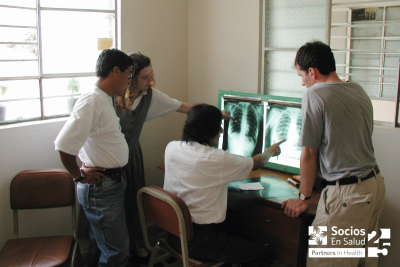
Primeros estudios de tuberculosis multirresistente liderado por Socios En Salud, Perú.
Jaime Bayona began interviews with health personnel in order to identify those patients who had active disease.
”At the beginning, obtaining this information was very difficult on the part of the health facilities, but it was finally achieved. There were more than 50 cases of multidrug-resistant tuberculosis in a community of 100,000 people, it was basically an outbreak,” said Jaime Bayona.
Tuberculosis continued to spread and without adequate treatment by the health system. Medications cost between US$20,000 and US$35,000, which made it impossible to afford. Despite various limitations, the Partners In Health team did not give up and demonstrated that multidrug-resistant tuberculosis is a curable disease and not a death sentence in resource-poor settings.
”Everything was stacked against us. A logistical and financial nightmare. It was very difficult to get the drugs, but it was a life or death situation,” Jim Kim shared.
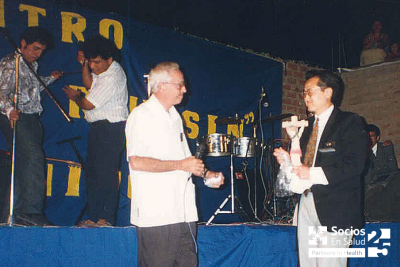
Dr. Jim Kim en la inauguración del auditorio Juan Roussin en el primer local de Socios En Salud en el AA.HH Raúl Porres Barrenechea, Carabayllo, Lima, 1996.
The community health workers were aware that this disease was deadly, yet they never gave up and began their activities, 6 days a week for two continuous years without stopping.
The hopelessness and exhaustion took hold of the patients, and to this was added the social determinantss that plagued the community. “It is not enough just to administer drugs, but it is also necessary to address the disease in a comprehensive manner with clinical, emotional, nutritional and social support,” Ophelia expressed.
This is how 75 patients overcame tuberculosis. This fact inspired the World Health Organization to revise the protocols, recommendations and treatment of the disease. But our efforts went further and resource support was requested from Harvard University, Brigham and Women’s Hospital. This allowed us to take a great leap forward.
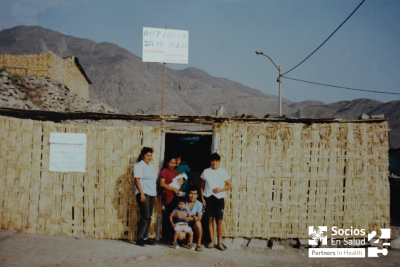
Primeros botiquines que organizó Socios En Salud, en el AA.HH. 28 de julio, Carabayllo. Lado izquierdo: Cristina Núñez Peralta, actual agente comunitaria de salud del Programa de Desarrollo infantil de Socios En Salud.
To date, Partners In Health is present in 11 countries (Haiti, Peru, Rwanda, Mexico, Sierra Leone, Liberia, Malawi, Lesotho, Kazakhstan, Navajo Nation, United States) and provides direct care to millions of patients, through its programs and projects in partnership with public facilities and community involvement.
At Partners In Health, we not only work to end tuberculosis, but also expand our interventions in responding to HIV/AIDS, Chronic DiseasesNon-Communicable and Cancer, Maternal, Child and Adolescent Health, Mental Health, and Social Protection through the community model of care.
Our main objective is to demonstrate that there is a solution for universal health care and this necessary to achieve social justice in humanity. Therefore, we strengthen the Peruvian health system and accompany patients in each and every step to build together an equitable world where every human being has the opportunity to be healthy and realize their full potential in life.